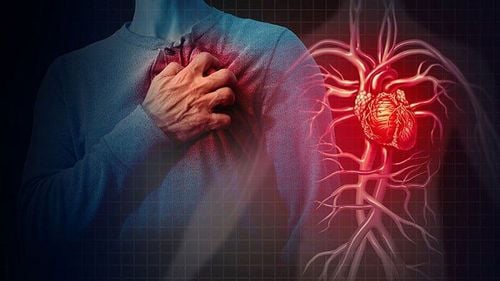This is an automatically translated article.
The article was professionally consulted with Specialist Doctor II Nguyen Quoc Viet - Department of Medical Examination & Internal Medicine - Vinmec Da Nang International General Hospital.The heart is an organ located in the chest cavity and is covered by a layer of protective tissue to avoid damage and inflammation from external agents. Heart infections can occur from a variety of factors that cause inflammation, damage to the endocardium, heart valves, pericardium, or myocardium.
1. Heart infection characterizes what medical condition?
Cardiovascular infections can occur in any layer of the heart, causing worrisome cardiovascular infections that can be life-threatening. These conditions include:Infective endocarditis: The most common type of heart infection, inflammation of the endothelium lining the heart chambers and valves, often occurs in people who already have problems heart valve disease or heart disease. Myocarditis: This is a rare infection of the myocardium with a common viral infection. Pericarditis: An infection of the outermost lining of the heart, usually caused by a virus. The most common subjects are men between the ages of 20 and 50, who can recover with proper treatment of symptoms and rest.
2. What are the symptoms of a heart infection?
Cardiac infections, especially endocarditis, can be obvious and develop rapidly, becoming life-threatening (except in cases of subacute or chronic endocarditis). The main symptoms of a heart infection include:Chest pain . Fever. Shortness of breath or shallow breathing. Heart palpitations, palpitations. Appearance of red, purple spots under the nails, on the skin, mucous membranes of the eyes or in the mouth.

3. Subjects at risk of heart infection
The risk of cardiovascular infection is higher in the following people:Place an artificial heart valve or other device in the heart (pacemaker). Heart infections in children are mainly caused by birth defects in the heart. Hemodialysis patient. Immunocompromised patients , eg HIV . Using drugs and stimulants. History of endocarditis or previous heart infection.
4. How is a heart infection treated?
Treatment for a heart infection will depend on what is causing the infection. Specifically:Antibiotics: Indicated for cases of inflammation caused by bacteria. Antifungal: Used to treat fungal infections. Anticoagulants: Used to treat endocarditis. Non-Steroidal Anti-Inflammatory Drugs (NSAIDs): Reduce inflammation. In addition, some patients need surgical treatment to:
Repair damage to heart valves or heart tissue affected by endocarditis. Removal of infected tissue, reconstruction or replacement of heart valves. Pericardial puncture for drainage to treat effusion. In summary, heart infections that lead to myocarditis and pericarditis are often difficult to prevent. Therefore, you should try to control the risk factors that lead to diseases that weaken the immune system.
Currently, Cardiovascular Center - Vinmec International General Hospital is one of the leading centers in the country for examination, diagnosis, screening and treatment of cardiovascular diseases. Vinmec not only has the convergence of a team of experienced and reputable leading experts in the field of surgical treatment, internal medicine, interventional cardiac catheterization, but also has a system of modern equipment and space. Designed according to 5-star hotel standards, Vinmec ensures to bring patients the most comfort, friendliness and peace of mind.
Please dial HOTLINE for more information or register for an appointment HERE. Download MyVinmec app to make appointments faster and to manage your bookings easily.














